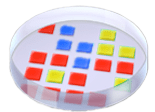The Wisdom of WAVES
No one could have predicted the way 2020 would go.
As I was applying for summer research programs in January, I pictured myself pouring over my research in some lab or office, exploring an unfamiliar college town, and spending time with new colleagues and mentors. While a physically immersive summer research experience wasn’t possible this year, enriching research experiences still were. As a participant in a (virtual) WAVES, I had the opportunity to work on an exciting project and broaden my skill set- all while a pandemic raged and protests against injustice were held worldwide.
My mentor- Acacia- and I both have an interest in pedagogy. This led us to conduct a case study involving both participants and mentors in WAVES. (I know, very meta!) Using surveys and Zoom interviews, I got to know a group of brilliant scientists- learning how everyone’s unique backgrounds and identities led them to their career path, and being given valuable advice along the way.
Our case study is still in progress- in fact, there will be more interviews to conduct and audio to transcribe next week. For now, I’d like to share some nuggets of wisdom I’ve learned from interviewing the wonderful people involved in WAVES.
🔗 Hindsight is 20/20. 
During this case study, we asked our interviewees to talk about “lightbulb moment” realizations they’ve had about their time in STEM. The response to this question was consistent: “lightbulb moments” rarely happened. Slow-burning realizations, however, did. Some realized the importance of the people you do science with; others, what they needed to be happy in a career; still others, how one’s approach to teaching and mentorship has roots in one’s own personal experiences. Self-reflection is necessary to grow both as a scientist and as a person. It allows one to use their skills to help others as well as possible.
🔗 Your career path may not be linear- and that’s okay. 
As an undergraduate, it can be easy to feel the pressure to be certain- of your major, of your post-grad plans, and of your career as a whole. Some people do find their “dream job” right away and never leave. Others, however, do not. Everyone’s path is different. If a career decision has made you unhappy, you don’t have to stick with it- as one interviewee said of their own experience, “…you can just stop what you’re doing and you can be something else.”
🔗 Science cannot be separated from issues of social injustice. 
The effects of structural inequities are not as abstract as some may think. They’re present in our everyday lives: in our classrooms, labs, workplaces, and more.
We begin to become aware of these injustices at different points of our lives. Regarding this topic, one interviewee remembered asking themselves: “What do the people look like around me? Does that match what the general population looks like?”
These are questions we should be asking ourselves throughout our lives.
As scientists, programmers, and engineers, it can be easy to feel like our research is distanced from these topics, or isn’t as meaningful as the work of those directly involved in the fight for justice. However, we have the power to create meaningful change. Regardless of your career, you can use your voice and talents to work towards a better world.
“Even within the context of science, you can pause what you’re doing and do something that will have a clear, tangible benefit.”
🔗 Many of today’s conversations revolve around the inherent power- or lack thereof- of certain identities. 
At this point in my life, I am beginning to think more about my own identities, the ways in which they intersect, and the ways I can use them to help those with less privilege. The conversations I have had through WAVES have been especially poignant for this reason. This case study has been an enriching experience- in more ways than I could’ve expected. It’s been eye-opening to learn how others approach the intersection of their identities, how this is intertwined with their experiences in STEM, and how they are using their identities to fight for the greater good.
I will carry their wisdom with me as I grow as a scientist and as a human being.
🔗 Acknowledgements 
I would like to thank my mentor, Acacia Ackles, for her continued support, understanding, and kindness. Her mentor profile is here.
I would also like to thank the (unnamed) people of WAVES who were interviewed over the course of the workshop, and whose quotes are used in this post.
